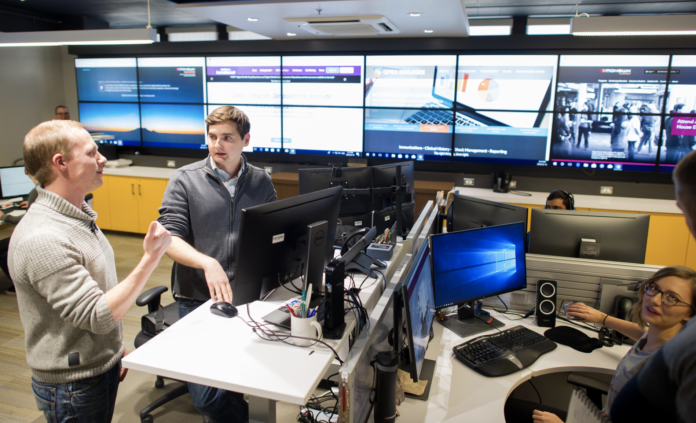
The application of digital technologies is transforming all aspects of healthcare. The volume of medical data generated worldwide is expected to double every 73 days by 2020. It’s estimated that an average person generates one million gigabytes of health data in a lifetime – equal to more than 300 million books.
Hamilton is a leader in digital health, from system integration and inter-operability to prototyping novel technologies, to educating the next generation of digital health entrepreneurs.
Exporting Digital Expertise
The mHealth & eHealth Development and Innovation Centre (MEDIC) at Mohawk College
is Canada’s only Technology Access Centre with a focus on digital health, and serves to bridge the gap between innovative small- and medium-sized enterprises and the mobile health and ehealth needs of an increasingly complex healthcare system.
MEDIC works with companies, governments, health agencies and hospital networks in a dozen countries and across three continents. State-of-the-art facilities and equipment, including a e-health ecosystem in a living lab environment, enable MEDIC to support companies across the health IT innovation lifecycle, from design to deployment.
Under the direction of founder Duane Bender, MEDIC created an immunization management system for 50 million people in Tanzania, building on work digitizing Ontario’s decade-old paper-based immunization records system. Closer to home, MEDIC teamed up with a local hospital to test SMArTVIEW, a technology enabling in-home monitoring of patients recovering from cardiac and vascular surgery.
As part of Mohawk College, MEDIC is training the next generation of digital health experts
for the sector, while McMaster University offers Canada’s only masters in e-Health, an inter-disciplinary program designed to build capacity around digital health informatics. The Institute for Applied Health Sciences, a joint collaboration between Mohawk and McMaster, is a multi-million one-of-a kind simulated hospital and long-term care centre that enables real-world experiences for more than 2,000 students a year.
“Life sciences is a key economic driver for our region and a strategic focus for our college. Working in collaboration with our industry partners, Mohawk is preparing the next generation of technicians and technologists and supporting applied research projects that transform ideas into innovative solutions.” —Ron McKerlie, President Mohawk College
A Space for Innovation
Clinicians, researchers and budgets are under duress in the face of an aging population
and healthcare is traditionally conservative about change, says Alexander, IBM Canada Healthcare Industry Technical Leader for the Innovation Exchange in partnership with HHS at the IBM Innovation Space located in downtown Hamilton. It is the only partnership of its kind focused on health care in Canada, bringing powerful IBM artificial intelligence, machine-learning and data analytics technologies in support of research scientists, industry and academic partners, start-ups and scale-ups working to solve healthcare challenges.
“Healthcare costs are mounting,” said Gordon Alexander. “We are bringing a transformation agenda to healthcare in order to accelerate the rate of adoption of innovation. Healthcare is complex and slow to move because patient health is at stake. We are fostering the necessary leadership, innovation, access to resources, proof of concept, the pilots and studies to bring change.” The Innovation Exchange provides the physical and technological space to bring everyone together to experiment and push innovative solutions.
Decoding Drug Resistance
Antibiotic-resistant pathogens are an increasing global concern. An estimated 700,000 people die annually due to drug-resistant microbial infections, rising to 10 million a year by 2050 without intervention.
Addressing this challenge are McMaster University researchers Gerry Wright and Andrew McArthur, world-renowned experts in antibiotic resistance and bioinformatics. Together they developed the Comprehensive Antibiotic Resistance Database (CARD), which has been transformative on a national and international level. It is used by health agencies around the world, including the World Health Organization and the U.S. Centers for Disease Control and Prevention.
Accessible to both public and private sector partners, CARD is a rigorously curated, searchable and up-to-date collection of known antibiotic resistance elements, pathogens and antibiotics. The ultimate goal is to create a system that collects and aggregates millions of data points a day, allowing for more effective treatment plans, better monitoring of the emergence of resistance, and guiding the development of new drugs.















